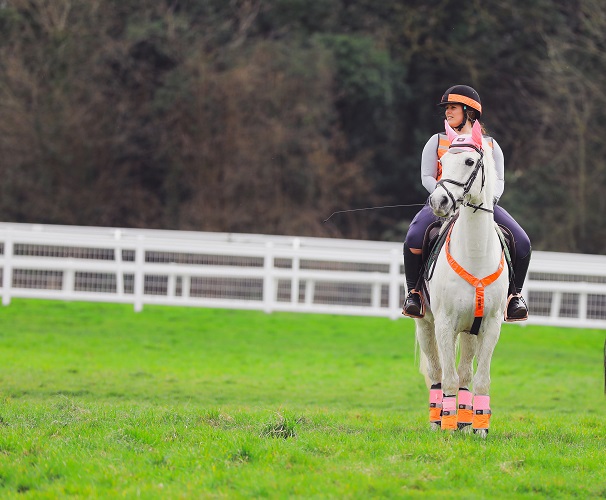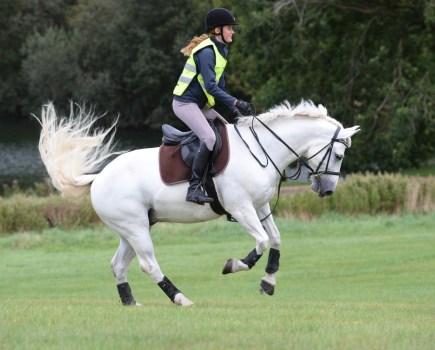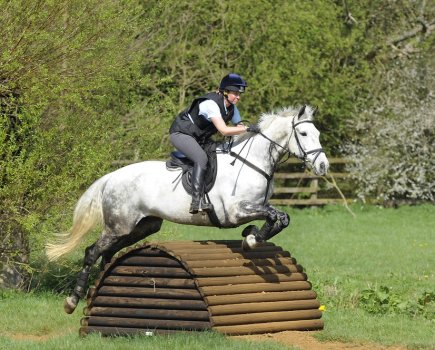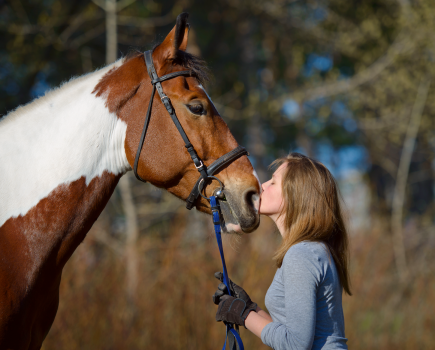Feeling nervous or simply lacking confidence can make riding horses tricky. With this in mind we’re here to answer some common questions and help you beat your riding nerves.
“I’m too nervous to compete on my horse”
If you find that your nerves make your horse seem nervous too, especially when you’re out competing. It could be that your horse is just mirroring back to you what’s going on inside your head. So let’s concentrate on keeping you calm! Make sure you ground yourself before you even start handling your horse. If you start to get anxious while handling, move away from him and calm yourself before going back. As soon as you start to feel uncomfortable, take a few calming breaths. Keep your own nerves under control and your horse will be much more relaxed too.
Calm your breathing
- Make your breathing as slow and rhythmical as you can
- Breathe in through your nose and out through your mouth
- Take twice as long to breathe out as you did to breathe in. This is the key. An easy way to do this is to count (e.g. breathe in to the count of three and out to the count of six)
Try to relax
- Relax your stomach and abdominal muscles – this will make you feel more relaxed and more grounded and your horse will respond to thisUSe
Use homoeopathy
- The homoeopathic remedy Gelsemium is fantastic for performance nerves. Take one tablet on the day (only take this remedy as and when you need it)
- Finally, Bach Flower Remedies may also help
For more information about Back Flower remedies and for expert advice on beating rider nerves visit www.carolineputus.co.uk
What can I do to build my confidence on a day-today basis?
International coach and confidence enthusiast Charlotte Dennis suggests the following:
-
- First of all, consider if you are in control of yourself? It’s important to take time to ensure you can control your emotions and your reactions before you deal with your horse.
- Trust your instincts, you know yourself and your horse better than anyone do always do what’s right for you.
- Be prepared and formulate a plan before you arrive at the yard. A ride with a plan is more likely to be successful for both of you.
- Be honest with yourself, set goals and test yourself but stay within safe limits.
- Are you in Control of your horse? Check that you’re consistent with your horse on the ground, round the stable yard and in the saddle.
- Set yourself small riding tasks each day to highlight any weak links and seek expert help and guidance if you’re struggling.
“I’m worried about falling off – is there a way to fall safely?
The fear of falling off is a common worry for many riders and just the mere thought of a fall can put some riders off jumping altogether. The truth is, falling off is inevitable in riding and it doesn’t matter whether you’re a dressage rider or top eventer, everyone can take a tumble from time to time. You can’t always prevent a fall, but you can be better prepared for it – the key is to fall and roll. Here’s how:
When you feel yourself falling, the best thing you can do is go with it. Don’t try to brace or save yourself with your arms, as much as you may feel you want to, because this is when you’ll get hurt. Tuck your arms in and roll as far away from your horse as possible to prevent further injury. It’s hard to fight the feeling when every fiber of your being wants to brace, but you must make a conscious effort to relax. Air jackets are a fantastic and necessary safety tool to help you feel more confident when riding and protect you when you do fall. I also highly recommend going along to a simulator day where they can teach you how to fall correctly. Once you’ve been ditched a few times you’ll begin to get used to it and you’ll naturally feel more prepared.
The British Racing School hold regular fall training sessions on a simulated horse to help you learn how to fall safely. For more information and how to get involved with one of the sessions visit www.brs.org.uk
My horse is scared of water, what can I do?
Many horses are frightened of water – it’s written in their DNA to be suspicious of it as they can’t judge the depth and it looks very different from solid ground – likewise riders tend to be a little wary as they don’t fancy a dunking. However, water jumps are an integral part of most cross-country courses and water trays are often found in many show jumping courses so you’ll need to overcome the fear. here are some simple steps that should help:
Step 1 – Begin on the ground
The best place to start is by leading your horse over an empty water tray in your arena or schooling area. Alternatively you can lunge him over it so you’re at a safer distance if you’d prefer. The key is to take everything nice and slow at first before building up the speed.
Step 2 – add water
Once he’s relaxed with the empty water tray, you can begin to introduce the key element – the water, before putting a small fence over it.
Step 3 – Get on board
If you feel confident enough, hop on board and try these exercises in the saddle. Remember to stay relaxed and breathe, don’t let your horse feel any fear down the reins.
Step 4 – leave the arena
Once you’ve conquered the water tray in your arena, take your horse out onto the cross-country course and walk him through the water – start slow then build the speed gradually.
“My horse keeps spooking with me”
A spooky horse can be unnerving but there are a few things you can do to be better prepared and to boost your confidence and partnership.
Before you proceed with anything you first need to eliminate any possible causes of injury, or problems such as badly fitting tack etc. Also check his feed and whether he’s getting a little too much energy. Once you’ve established this, ask your friend if someone else can hack him out (insurance permitting), then you can see if it’s rider connected or just something he does. If he’s still difficult then you will need time and patience to sort the problem.
Begin by getting a friend to hack out with you on a calm and experienced horse and keep the rides short but more frequent. If you’re able to, box him up and take him somewhere new as often as you can. The problem may well be that he remembers the issues he’s had on certain routes before. When teaching him to forget this, he’ll need positive experiences to build on to help develop his confidence.
How can I be more positive when I ride?
Gaining confidence is all about positive doing, not just positive thinking, and while a positive mental attitude is hugely important, it can often be undone when there’s an absence of positive doing – the actions that back up your positive thinking. Performance coach Charlie Unwin says: “Think of riding as you would cooking – everyone can relate to cooking. If you’re cooking a meal, you’re likely to use a recipe and having that recipe is a security blanket that stops you questioning yourself. If you know you’ve followed your recipe then you know you’ll create a good meal and if you follow your own tried and tested methods when riding, you have a purpose and a goal and you know you’re doing it right.”
Practise your recipe
“The biggest mistake you can make when cooking is waiting until you have 20 guests in front of you before you try out a new recipe – this creates a lot of pressure and too much pressure and not enough practise can be a recipe for disaster,” says Charlie. “The same applies when riding, don’t wait until you’re at a competition to implement your new training regime – practise it at home first, this way you’ll feel much more confident about what you need to do when you go out competing.”
Keep goals simple
As Charlie explains, the best cooks aren’t always the ones who produce the fanciest meals, some of the best cooks do the simplest meals extremely well – it’s about getting the basics spot on. “Recognise what you do well and what your limitations are. For example, if you haven’t got a natural dressage horse, you might create some great stuff in your training, but you shouldn’t expect miracles at a competition – you need to operate within the parameters you set yourself. So, with that in mind, practise getting what you’re capable of doing spot on and don’t try to make everything too complicated. Once you’ve mastered the basics, only then can you try to build on them and put in some fancy touches. And, if the more complex stuff goes wrong, at least you’ll always have the basics to fall back on.”
Write down your plan
“Great family recipes are all written down and writing things down helps us to digest the information,” says Charlie. “It’s also important that we write things down so we can remind ourselves of them when we lose confidence. It’s hard to hold every bit of information in our heads. When we write our goals, our successes and our plans down and look at them in black and white, it can be a real confidence boost.”
Charlie Unwin is an Olympic psychology coach working with athletes, businesses, performing arts and the military to enhance human performance within demanding environments. For more information, visit www.performancelegacy.com or follow Charlie on Twitter @charlieunwin









